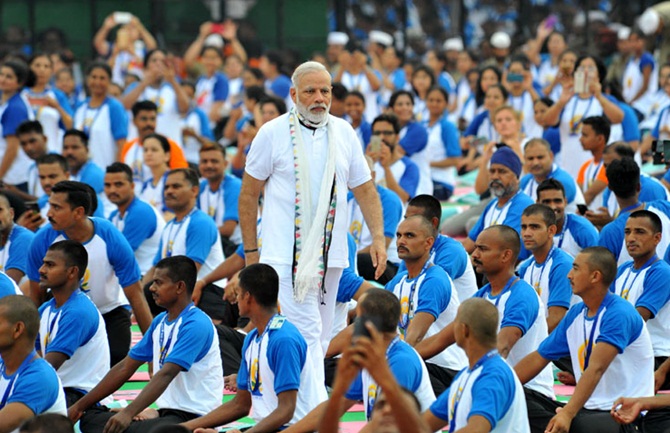 | « Back to article | Print this article |
Not only does yoga help beat stress, it also helps them stay agile physically and mentally, say CEOs.
While the world celebrates International Yoga Day on Tuesday, many corporate executives (CEOs) have been rolling out their yoga mats in the morning for years.
Not only does yoga help beat stress, it also helps them stay agile physically and mentally, said the CEOs Business Standard spoke to.
"Yoga helps me stay more flexible, it has enhanced my ability to stay calm and focused, and that's one of the best takeaways," said Vijay Chandok, executive director (designate) at ICICI Bank.
Chandok started practicing yoga in 2004, when he was looking at ways of managing stress and hired a trainer to teach him. "I feel incomplete without this daily routine," said Amit Bhagat, chief executive at ASK Property Investment Advsiors, part of Mumbai-based fund manager ASK Group. Bhagat has been practicing yoga for the past two years.
"It is an excellent discipline, which helps you align mind and body. It energises you and keeps you composed," he adds.
Harshil Mehta, chief executive at housing finance company DHFL, said yoga was one of the oldest holistic health care disciplines.
"Creating a harmonious relationship with your mind and body is vital for a healthy lifestyle. It is one of the most recommended forms of exercise to gain control over your mind and body, thereby ensuring good health and reduced stress and anxiety," Mehta says.
Sanjiv Khandelwal, founder of online B2B marketplace XSTOK, says he practices yoga for about an hour every day and has been seriously pursuing it for the past two and a half years.
Khandelwal did an 'Inner Engineering' programme at Isha Foundation's Isha Yoga Centre in Coimbatore, which combines yoga and meditation.
"Now I get angry only if a situation requires it, rather than unconsciously. I have developed a feeling of love towards my colleagues, which was not there earlier," he said.
Starting July 1, his firm will hold a one-hour voluntary yoga session twice a week.
"I expected only 10 to 12 per cent to register. To my amazement, about 35 per cent have signed up," he adds.
Ahead of the second International Day of Yoga to be observed on Tuesday, a poll conducted by ICICI Lombard General Insurance revealed 65 per cent of respondents acknowledged that the formal inception of such a day has encouraged them to take the age-old practice more seriously.
Furthermore, 52 per cent said they were likely to take up yoga to combat work-related stress as against outdoor sports (24 per cent) or visiting the gymnasium (10 per cent).
A study by global market research company Ipsos said a majority (51 per cent) voted yoga as the best form of exercise, followed by walking (31 per cent), running (11 per cent) and going to the gym (eight per cent).
"Prima facie, hard selling benefits of yoga is not the need of hour, adopting it and making time for it is key for vitality and a healthy life," said Amit Adarkar, managing director, Ipsos India.